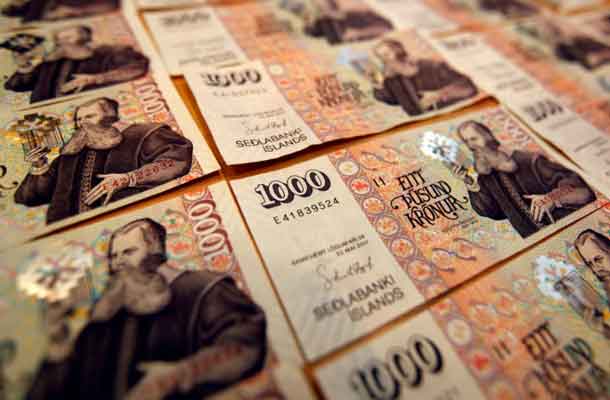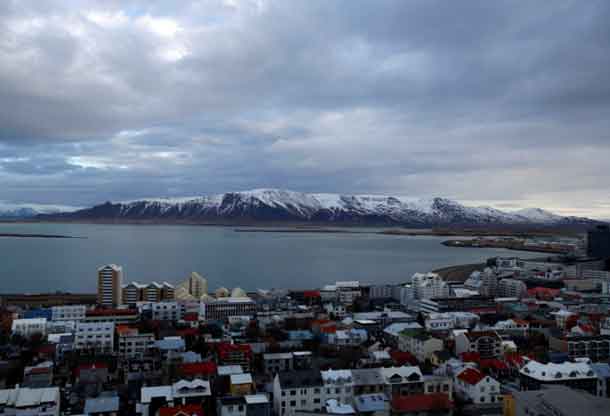

By Maiya Keidan and Marc Jones
LONDON (Reuters) – Iceland spent nearly a decade trying to keep foreign money in the country after a financial collapse, now it is trying to keep some of it out.
The economy is booming again and hedge funds and other foreign investors want exposure to a surging tourism sector, banks, property, infrastructure and the soaring krona currency.
Most capital controls from the 2008 banking crisis were lifted in March allowing money to flow in and out of the country more freely.
But with over 20 financial crises since 1875 and warnings from economists about the risk of overheating again, the government is being cautious.
It has left in place restrictions making it prohibitively expensive to buy government bonds which offer returns of 4.5 percent<REIISK3MD=>, the highest of any developed economy.
On Monday, the central bank took another step to try and break the cycle of boom and bust on the isolated North Atlantic island, clamping down on derivatives and other avenues it was worried were being used to bet on the krona.

“There are a bunch of people I know who would love to put money into Iceland but they simply can’t because of restrictions on the inflows,” said Mark Dowding, who runs a hedge fund at BlueBay Asset Management and bought into the Icelandic government bond market in 2015, before the central bank rules were introduced.
The government is preparing other steps to make Iceland less attractive – a contrast to other economies recovering from crisis which have welcomed inflows of money.
The government is preparing to raise taxes for the tourism industry which has been growing at 20-25 percent a year as foreigners flock to its volcanoes, glaciers and geysers. It is also considering a currency peg for the krona.
OPPORTUNITIES
Iceland offers other exciting investment opportunities. Growth of more than 6 percent is forecast this year and the krona is up 20 percent versus both the dollar <ISKUSD=R> and euro <ISKEUR=R> over the last 12 months.
The central bank has cut interest rates four times in the last year and analysts say it would need to cut further if it wants to slow the rise of the currency. That could further stimulate the economy.
“Once every decade or two, I come across a market overseas which is most attractive and is worth considering,” said Gervais Williams, a portfolio manager at London-based Miton Group.
“That last happened in 1995 in Ireland and Iceland is the market I now like.”
Cumulative net capital inflows have gone from almost nothing to 150 billion crown (1.13 billion pounds) in two years.
New cars sales are at the highest in 10 years, Marriott will open Iceland’s first five-star hotel next year. Data centre firms are also moving in as the climate and cheap geothermal energy cut the costs of cooling huge server stacks.
A potential float of Arion Bank, the domestic arm that emerged from the collapsed Kaupthing bank, meanwhile is expected to lead to a surge of new foreign money into the stock market <0#.OMXIPI> which currently lists just 17 firms.
Several hedge funds — Och-Ziff Capital Management Group, Taconic Capital Advisors and Attestor Capital — bought stakes in Arion privately, after the bulk of capital controls were lifted earlier in the year.
On the back of the shifts, London and Iceland-based fund firm GAMMA Capital Management launched its first two funds –including one hedge fund — for foreign investors in November last year after requests from abroad.
“We have been getting a lot of interest …but investing in Iceland brings a lot of hurdles, so we created a simple conduit,” said Hafsteinn Hauksson, economist at GAMMA. Both funds have more than doubled in size this year, he said.
RED HOT
Nevertheless, there are concerns that Iceland could overheat again.
The International Monetary Fund said in a report last week that there was a need for “vigilance with regards to credit growth and the real estate sector, labour market tightening and wage increases”.
It called for capital inflows to be managed carefully.
Iceland has a history of spectacular booms and bust.
The head of Iceland’s central bank regularly describes its 2007-2008 banking bust — when the top-three banks, Kaupthing, Glitnir and Landsbanki collapsed under heavy debts — as “the third biggest bankruptcy in the history of mankind”.
A 2015 report by Bank of Iceland economists noted that this was not Iceland’s first financial crisis.
“In fact, over a period spanning almost one and a half century (1875-2013), we identify over twenty instances of financial crises of different types,” it said.
“Recognising that crises tend to come in clusters, we identify six serious multiple financial crisis episodes occurring every fifteen years on average.”
The report said the crises typically involved a sudden collapse in the currency and capital inflows.
GLACIER BONDS
Wary of its history and nervous that the end of capital controls would bring a wave of foreign money, the central bank brought in a rule in May 2016 forcing buyers of its bonds to park additional money in a low interest account.
That costly ‘special reserve ratio’ arrangement has meant foreign investment in Icelandic debt has dropped close to zero. Along with repeated interest rate cuts, it has taken some of the steam out of the crown over the last month.
“In the current domestic and global circumstances, the risk of excessive and volatile carry-trade type capital inflows was becoming significant” a central bank spokesman said of why the measure was brought in.
Monday’s decision to scale back some exemptions to its post capital controls ‘Foreign Exchange Act’ aimed to make it harder for foreign investors to bet on the krona.
Those exemptions had made it possible to conduct carry trades by issuing krona-denominated bonds — nicknamed Glacier bonds — and entering derivatives contracts with domestic banks.
“Experience has shown that capital inflows in connection with foreign issuance of krona-denominated bonds (Glacier bonds) could weaken monetary policy,” the central bank said.
Iceland also still has controls in place that prevent proceeds from the sale of pre-crisis bonds leaving the country unless the investor signs up to the terms of the central bank’s buy back arrangement which offer a punitive exchange rate.
(Additional reporting Carolyn Cohn, Sujata Rao and Abhinav Ramnarayan in London and Stine Jacobsen in Denmark; editing by Anna Willard)





